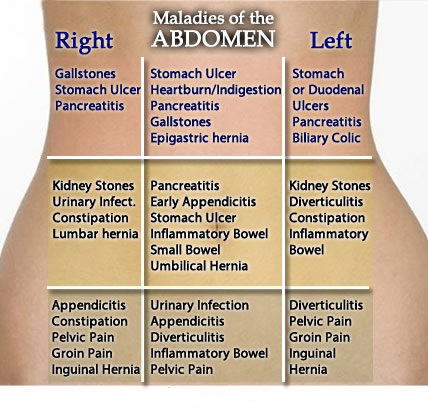
When you have abdominal pain, the pain may be severe or mild. It may occur anywhere in the abdomen, from the lower back to the buttocks. It can occur anytime, especially after eating certain foods or drinking alcohol. Symptoms may occur any time, and it can be accompanied by other symptoms, including lower back pain, shoulder pain, and groin pain. Sometimes, it can also radiate to other areas of the body. The best thing to do is seek medical attention.
In order to diagnose the cause of abdominal pain, a doctor will ask about your symptoms, the location and duration of your pain. He or she will also perform a physical examination. If you are a female, the doctor may perform a pelvic exam. For men, the doctor will examine your penis and scrotum. Diagnostic procedures may be recommended for more serious cases of abdominal pain. These tests can help your physician make the right diagnosis.
To diagnose the cause of your abdominal pain, your doctor will take your medical history and perform a physical examination. This includes questions about your menstrual cycle and urinary frequency. A physical examination can help diagnose various conditions. Your doctor may also order blood tests or other diagnostic tests to rule out an infection. Although they are not definitive, they can help your doctor determine if your pain is caused by a bacterial infection or another problem.
Regardless of what causes abdominal pain, the doctor will be able to determine what is causing it. Your doctor will usually ask you about the cause of your pain, how long you’ve had it, and where it comes from. Your doctor will also perform a physical exam and talk in detail about your lifestyle. The doctor will also check for signs of inflammation, such as gastroesophageal reflux disease and ulcers. If your pain is chronic or severe, your doctor may also order some diagnostic tests.
If your pain is caused by a bacterial infection, the pain could be caused by a bacterium, an infection, or a heart attack. It is important to seek medical attention for abdominal pain because it can be caused by many different things. For example, a bacterial infection can cause abdominal pain. Another disease that causes abdominal pain is a stomach virus. These are all common and you should check with your doctor if you suspect stomach problems.

If your stomach pain is caused by an infection, it is important to consult your doctor. Pain can be caused by an infection or bacterial infection. It can also be a systemic problem such as underlying cancer. The doctor can make a diagnosis. The site diariolarepublica.org.mx
can also recommend a course of treatment for your pain. Once you have determined the cause of your abdominal discomfort, your doctor will recommend the next step in your treatment plan.
Symptoms of abdominal pain include inflammation, bloating, and loss of blood supply. Some pain may be caused by an infection or a symptom of a disease affecting your organs. Ultimately, your doctor can help you find the right treatment for your specific abdominal pain. There are many different causes of abdominal pain, but the cause is usually the same. The most common of these is obstruction.
The most common cause of abdominal pain is an infection. This infection can lead to severe pain. The cause of abdominal pain depends on the location of the pain. When symptoms are caused by an underlying medical condition, a doctor may perform a physical exam to determine the cause. Symptoms may include fever, diarrhea, bleeding, and other signs of illness. If the cause is an infection, the doctor may do an ultrasound. The patient may then undergo a biopsy to rule out infection.
Abdominal pain is usually caused by an infection, but can also be caused by cancer. If you have abdominal pain, your doctor may recommend pain-relieving injections to treat it. However, some causes of abdominal pain are more serious and require medical attention. Your doctor will ask you to describe your symptoms and the location of the pain so the doctor can determine the cause of the pain. Your doctor may also perform an abdominal ultrasound, which is a diagnostic test that allows them to look at organs in detail.